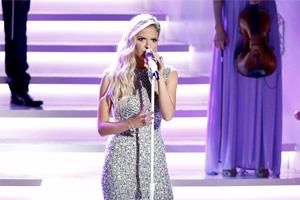Even by 2017 standards, it was a strange night of TV, but that is what TV viewing — the old-fashioned sitting-in-front-of-the-family-set kind — has become.
I tuned into the final performances on The Voice, both curious to see who had made the final four and interested to know whether any of them have a shot at a credible recording career. I used to be religiously loyal to The Voice. But then viewers’ habit of consistently voting the mediocre country singer over the promising soul diva and potentially chart-topping pop artist began to wear on my nerves, as did the one-note bellicosity and faux bonhomie of Blake Shelton began to wear on my nerves.

This was one of the very few Voice seasons I hadn’t watched all the way through, so I was curious to see how it had played out in the intervening weeks since the blind auditions, which I did see. “The blinds,” as Voice followers know them, are still appointment television in my household, and remain the highlight of the entire series, in my view. By the time you read this, the season ’s Voice champ may have been named — the consensus pick appears to be, wait for it, country artist Lauren Duski (left), coached by, wait for it, Blake Shelton — and for once The Voice may have some lasting effect beyond the all-consuming ratings race.
The night’s performances, by Duski, youthful chanteuse Aliyah Moulden, gospel singer and Alicia Keyes pick Chris Blue, and ‘60s-vibe Doobie Brothers enthusiast Jesse Larson — a hard-core musician with a big-ass beard and a voice to match — were proficient, if not particularly moving. That sums up The Voice in a nutshell: The singers at the end tend to be good, occasionally really good, but hardly ever great.
The Voice is full of joy, though, and that’s what makes it so compelling to viewers. It’s warm without being maudlin, technically sound if not brilliant. It’s safe viewing, even if the banter between Shelton and Adam Levine can cross the family-friendly line on occasion. Keyes, in particular, has injected a touch of much-needed class and dignity; she might be the most articulate and genuinely soulful coach/mentor of any music reality-TV competition on television.
And yet, it was really hard to concentrate. The reality of live TV is that things happen in the moment, and in my time zone — the West Coast —
The Voice was on the air at the exact same time as the breaking news from Manchester, England about a bomb exploding at an Ariana Grande concert. I spent the evening flipping back-and-forth between
The Voice and the breaking news on CNN, MSNBC and BBC World.
The painful truth — and the reason this juxtaposition was made even more poignant — is that the Ariana Grande audience is virtually identical to The Voice audience: young girls and their moms. Grande, from Boca Raton, Fla., is 23. Christina Grimmie (above), the talented YouTube artist who made her name on The Voice, was just 22 when she was gunned down by an obsessed fan at an autograph signing.
The parallels were harrowing. The young kids and their adult chaperones fleeing Manchester Arena could just as easily have been the young kids in the live audience watching The Voice alongside their adult chaperones. Switching back and forth between the two made for uncomfortable viewing.

Live television — coupled with multi-screen viewing on social media — is one of the great benefits of watching TV in 2017. We are all witness to world events, in real time. Oddly, though, the 24-hour cable news channels are often at their worst during breaking news — that is, real breaking news, and not the overhyped, fake breaking news outlets like CNN make their calling card. There were too many insensitive, tone-deaf on-air interviews with witnesses and victims of the Manchester bombing. Even the normally reliable Anderson Cooper did himself no favors constantly cutting off witnesses in mid-sentence to ask seemingly pointless questions. One BBC newsreader relentlessly badgered a frantic mom about how she was dealing in the moment with the knowledge that her kid was missing in the mayhem. At least no one asked, ‘How do you feel,’ at least no one that I saw watching live while flipping back and forth. That question seemed to be the private reserve of the increasingly tone-deaf Carson Daly, who actually asked that of a couple of the Voice finalists. (I worked nearly a decade covering hard news at a big-city newspaper-of-record; I can well imagine some TV and print newsrooms banning that question entirely in their official newsroom ‘code of conduct’ before long if they haven’t done so already.)
Flipping back and forth between the two, I found myself wondering how the music industry can possibly shield itself against evildoers determined to cause harm. Live events are the lifeblood of the business, after all.
The Voice will name its winner, and nothing — not even a terrorist attack on a teen-pop concert venue half a world away — will detract from that. Nor should it. There will be joy, and tears of the right kind.
Still, though, it made for a very strange night of viewing. TV is meant to be escapism, after all, but we’re living in a new world.